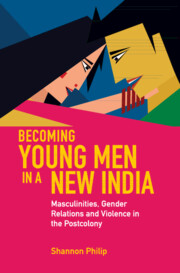Book contents
- Frontmatter
- Contents
- List of Figures
- Note on Terms and Translations
- Acknowledgements
- Introduction: Young Men in a Neoliberal India
- 1 Becoming a ‘New’ Indian Man
- 2 Making Masculine Bodies
- 3 Desexing Men and Hypersexing Women
- 4 Urbanisation and the Gendering of a Smart City
- 5 Men’s Violence and Women’s Safety
- Conclusion: Fragilities of a New Indian Man
- Appendix: Urban Smart Striver Profiles
- References
- Index
4 - Urbanisation and the Gendering of a Smart City
Published online by Cambridge University Press: 31 March 2022
- Frontmatter
- Contents
- List of Figures
- Note on Terms and Translations
- Acknowledgements
- Introduction: Young Men in a Neoliberal India
- 1 Becoming a ‘New’ Indian Man
- 2 Making Masculine Bodies
- 3 Desexing Men and Hypersexing Women
- 4 Urbanisation and the Gendering of a Smart City
- 5 Men’s Violence and Women’s Safety
- Conclusion: Fragilities of a New Indian Man
- Appendix: Urban Smart Striver Profiles
- References
- Index
Summary
Vignette: Fast Life in a Fast City
‘Now we have to go faster and faster (jaldi jaldi),’ said Kartik, laughing as we rushed to change metro trains. ‘There is no time to sit around anymore in life, even the metro people want us out,’ he continued laughingly as we dodged the crowds and rushed up the escalators. Whilst changing metro trains, Kartik and I were discussing the recent changes in the Delhi metro regulations, where customers were only going to be allowed 90 minutes of travel time on a single ticket. This was being reduced from the 170 minutes we previously had as commuters on a single ticket. Mimicking this new shorter travel time, Kartik decided to run through the metro station, telling me I had to rush too: ‘Brother, now times are changing (waqt badal raha hai), if you don't keep up, you will keep sitting only.’ When we finally reached the platform for the Yellow Line, we waited in an orderly queue and boarded the train from the ‘general compartments’ towards the back of the train.
As we got inside the metro, Kartik continued to explain to me, ‘It's good only that they are reducing the timing, otherwise people abuse the system.’ Then quickly in a pensive tone he carried on, ‘But now yaar, we will have to go and sit outside with the dogs (kutton ke saath bethna padega), so that is not good, nobody wants to sit outside with the dogs!’ and started laughing again. I simply smiled back at him as the doors of the metro shut and the cool air from the metro air conditioner intensified. A woman's voice on the Tannoy system explained that the next stop was ‘Patel Chowk’ as the low electric hum of the metro propelled us forward. Although there was no space for us to sit in the metro, the clean, cool and comfortable surroundings made the journey pleasurable. Kartik pulled out his phone to play some music and passed me one end of his earphones and put the other end into his ear.
Before Kartik could pick a song, the metro reached the next station. The doors opened and more people got in, pushing us tighter. Kartik glanced at the entering crowd, which happened to be a group of women.
- Type
- Chapter
- Information
- Becoming Young Men in a New IndiaMasculinities, Gender Relations and Violence in the Postcolony, pp. 101 - 128Publisher: Cambridge University PressPrint publication year: 2022



